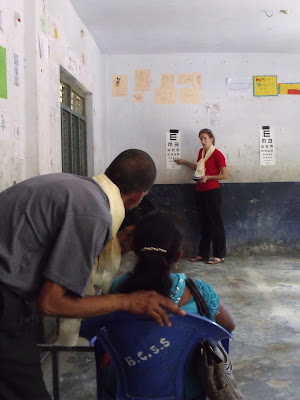We've been busy, very busy, this week working with a team of Australian volunteers on their annual eye camp. This camp is conducted by a fabulous group of people who come over for 2 weeks and serve remote communities all over Nepal with free eye care. This year the camp has travelled to Myagdi Beni, Baglung, and Parbat, all in the vicinity of Pokhara. Myagdi Beni our first destination was located about 80km outside of Pokhara, but due to the river flooding overnight before our arrival the main bridge providing access to the town was washed away. We were forced to take a slow, alternative road as a detour. This provided a few interesting hours on our way out to Baglung, when a truck became stuck on the road infront of us. Everyone keenly got involved in 'building the road' for the truck to unblock the road so we could continue on our way! This seems to be a bit of a theme this year with our last destination, Machapuchre Village inaccessible due to a large landslide a few days ago. Nevertheless we will hold the camp as close as possible to the village in the next few days.
The eye camp really gives us an opportunity to meet a wide variety of people, young and old. Some come easily on their own, well dressed, speaking english, others come assisted with a relative or friend, hobbling along, walking stick in hand, mostly deaf, dressed in little more than rags, blind as can be. Young children who at first sight look like they are fine, come through the vision screening room with terrible eyesight. Others have great or okay eyesight in one eye, but have damaged the other eye or have a cataract. Many women in particular come complaining of constant headaches, but their eyes are fine. No doubt the blinding glare of the sun, in contrast with the dim interior of village houses, open smoke cooking fires inside, and the dust all contribute to straining the eyes. Unfortuntaly there is little we can do for these people - we give eye drops but know its not really going to solve their problems. We advise they buy sunglasses. To some we provide sunglasses, but the real aim of the camp is to provide glasses to those that need them due to short sightedness or long sightedness.
Each day there are people waiting, always more on the second day in the same location. We screen them with a simple vision chart. Those that need glasses (the majority) are sent through to visit the optometrists. They are prescribed glasses or referred for cataract surgery (to be provided for free at a local hospital). In the dispensing room these are provided - and rewarded with many happy smiles. Its an efificient system that churns non-stop all day long, but even so the lines are long and its difficult to see the unlucky ones at the end of the line turned away at the end of the day. Even so we are seeing between 700 - 1000 people each day.
 |
| First stage of vision screening |
 |
| Visitin the optometrist |
 |
| 3 optom's at work |
 |
| Truck blocking the road between Beni and Baglung |
 |
| Big queues in the hot sun |
 |
| Happy school girl with her new glasses |


















































